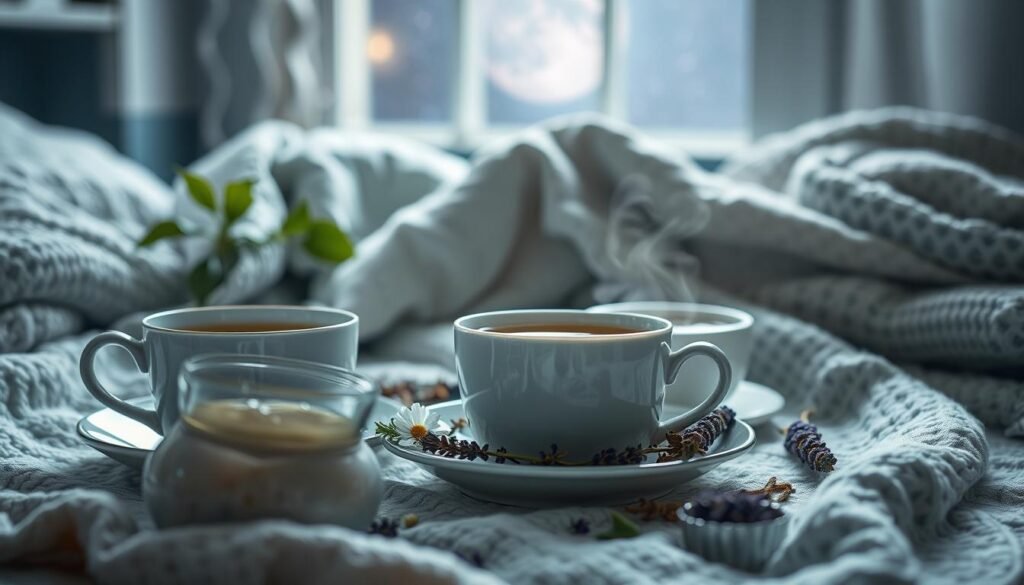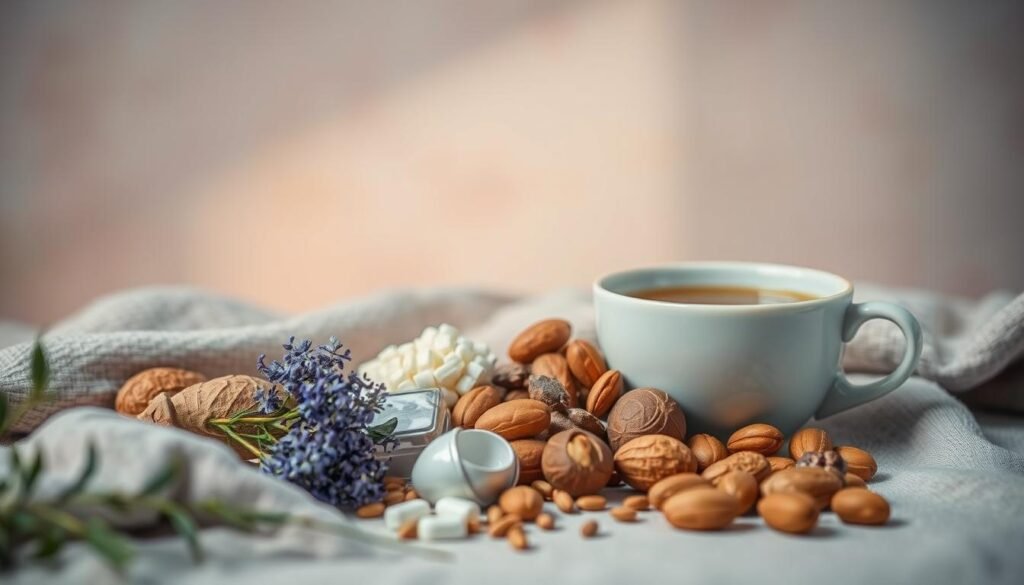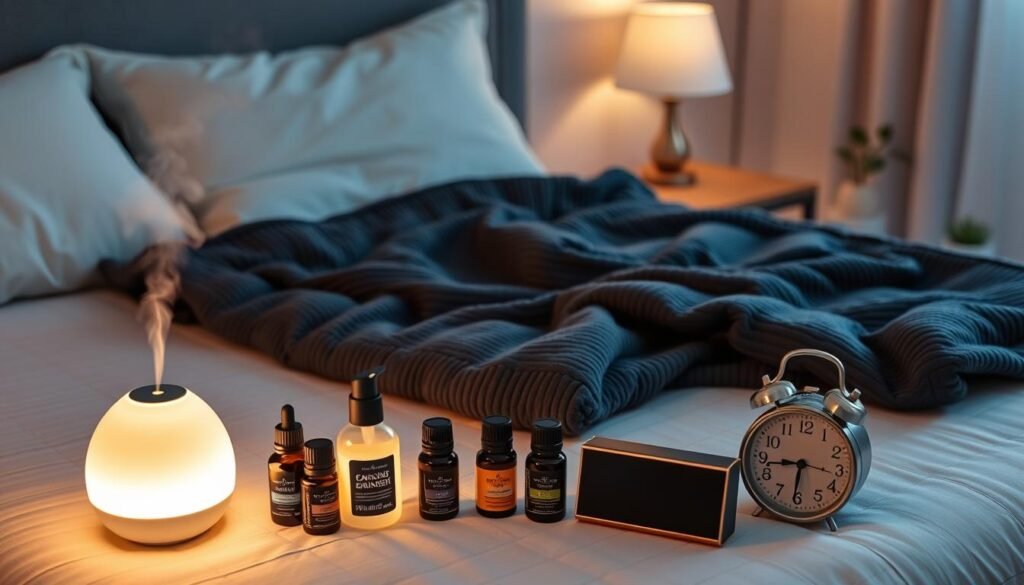Almost 30% of adults in the United States have faced insomnia at some point. This fact shows how common sleep problems are. Many look for solutions and natural sleep aids are among the popular choices. They are seen as safer than drugs. Options like melatonin, valerian, and chamomile can really help with sleep.
But, it’s key to know that not every natural sleep aid works the same for everyone. Something that helps one person might not help another. That’s why it’s vital to learn about the different options. This guide can help you find what might work best for your sleep troubles.
Key Takeaways
- Natural sleep aids can encourage relaxation and promote better rest.
- Melatonin is effective for many individuals, often requiring less than 0.3 mg.
- Herbal options like valerian and chamomile have been used for centuries to combat insomnia.
- Choosing the right natural aid may depend on specific sleep challenges and individual health conditions.
- Consultation with a healthcare professional is advisable before using these aids.
Understanding Natural Sleep Aids
Natural sleep aids are often chosen by those who need help sleeping. They include dietary supplements from plants and natural products like vitamins. People look to these aids when traditional medicine doesn’t work or causes bad side effects.
About half of all Americans face sleep problems from time to time. This shows a big need for effective solutions. Melatonin supplements are helpful for some sleep issues. But they’re usually for short-term use. It’s a good idea to talk with a healthcare professional before trying any sleep aids.
Lavender’s scent might lead to deeper, better sleep. Valerian root could also help by increasing GABA levels in the brain. The common dose for valerian is 300 to 600 milligrams. On another note, studies suggest CBD oil might lessen anxiety and aid in sleep. Recommended doses are between 25 and 175 milligrams daily.
Many natural products are out there to help with sleep. Glycine supplements are safe at 3 grams for better sleep. Herbal remedies, like chamomile extract, are used too. They are taken in doses of 200 to 270 milligrams to help relax. However, even if most supplements are considered safe, one should be cautious. For example, kava can cause serious liver damage.
How Certain Ingredients or Products Might Promote Sleep
Searching for good sleep aids means looking at many things that might make sleep better. Things like melatonin supplements, herbal sleep aids, and certain foods can help those who have trouble sleeping.
The Role of Melatonin Supplements
Melatonin is key in controlling when we sleep and wake up. If you have trouble with sleep, like from jet lag or odd sleep times, supplements might help. Taking them before bed can improve how fast you fall asleep and the quality of your sleep.
Herbal Remedies for Sleep
Around the world, 80% of people turn to nature for sleep help. Herbs like valerian root, chamomile, and lemon balm are popular. They are known to calm and relax us. Taking 200 milligrams of chamomile extract each day for a month can help older adults sleep better. Valerian root, in 400-900 milligram doses before bed, could also help with insomnia.
Sleep-Inducing Foods and Teas
What we eat affects how we sleep. Foods like tart cherry juice, kiwi, and fatty fish have sleep-boosting elements. Tryptophan-rich foods are great too because they help make serotonin and melatonin. Eating a balanced diet, including vegetables, whole grains, and lean proteins, is key for better sleep. Plus, drinking teas like chamomile can calm you before bed, making it a great part of your night routine.
Popular Herbal Remedies for Sleep
Many people search for natural ways to sleep better. They turn to herbs known for their soothing effects. Valerian root, chamomile, and passionflower are popular choices. Each herb has special qualities that can help you enjoy a deeper sleep.
Valerian Root
For centuries, people have used valerian root to relax and sleep better. It boosts GABA levels, making the nervous system calm. Studies suggest that 300-600 mg of valerian root can lengthen sleep and shorten the time it takes to fall asleep. This makes it a helpful natural remedy for those fighting insomnia.
Chamomile
Chamomile is famous for its relaxing effects. Its power comes from the antioxidant apigenin. Apigenin makes the brain feel more relaxed and ready for sleep. Drinking chamomile tea before bed can help improve sleep, making it a favorite in bedtime routines.
Passionflower
Passionflower is another excellent choice for better sleep. Research says passionflower extract improves how long and well people sleep. Drinking passionflower tea before bed can help. It’s especially useful for those with insomnia. It aids in relaxation and elevates sleep quality.
Sleep-Inducing Teas
Teas are a pleasant and effective way to get better sleep. They mix tasty flavors with calming ingredients. Chamomile tea and lavender tea are famous for making sleep easier. They are loved for their special benefits.
Chamomile Tea
Chamomile tea is known for its calming effects. Research shows it may improve sleep quality, helping those with fatigue and anxiety. One study found that women drinking chamomile tea felt less tired and depressed after having a baby. This shows how comforting it can be.
Lavender Tea
Lavender tea is praised for its relaxing smell. Studies show it can lessen anxiety and depression for a peaceful night. The U.S. Food and Drug Administration considers lavender safe. This makes it a great choice for a bedtime tea.
Sleep-Promoting Botanical Blends
Tea lovers often try different plant blends for better sleep. Mixes with valerian root, passionflower, and magnolia are becoming popular. Valerian root is known to improve sleep. Passionflower might ease the mind. These blends work by calming the brain, reducing anxiety, and helping you relax.

Melatonin Supplements: Are They Effective?
Melatonin supplements are popular for those who find it hard to sleep. About 3 million Americans used them in 2012 for sleep issues. The body naturally makes more melatonin two hours before bedtime, helping us fall asleep.
Studies show melatonin can help people fall asleep faster, especially with insomnia. It works well for those with delayed sleep phase syndrome too. People often take 1 to 3 milligrams two hours before bed.
Using melatonin for a short time is usually safe for adults. It’s good to take a break after one to two months to check how you sleep without it. But, it’s not for everyone. Pregnant or breastfeeding women and those with some health conditions should avoid it. Side effects might include dizziness and headaches.
Although melatonin can help you fall asleep, it may not keep you asleep all night. It’s more useful for those who have trouble starting to sleep rather than staying asleep.
| Condition | Recommended Dosage | Notes |
|---|---|---|
| Insomnia | 1-3 mg, 2 hours before bed | Helps individuals fall asleep faster |
| Delayed Sleep Phase Syndrome | 1-5 mg, 30 minutes before bed | Significant improvement noted |
| Children with Sleep Disorders | 1 mg (infants), 2.5-3 mg (older children) | Short-term treatment recommended |
| General Sleep Aid | 1-3 mg, 2 hours before bed | Not suitable for everyone, caution advised |
As more people use melatonin, consulting a healthcare professional first is crucial. This is especially true for parents thinking about it for their kids. This ensures safe use and proper sleep benefits.
Sleep-Promoting Vitamins and Minerals
Knowing about sleep-helping vitamins and minerals can make sleep better. Things like magnesium, zinc, and vitamin B6 are key for good sleep. If you get enough of these, you might sleep more soundly and be healthier.
The Importance of Magnesium
Magnesium is super important for the body and for sleep. It’s in nuts, seeds, and green veggies and helps calm your nerves. If you don’t get enough magnesium, you might find it hard to sleep well. Taking enough can make your muscles relax and help make sleep hormones.
Benefits of Zinc and Vitamin B6
Zinc and vitamin B6 are also great for sleep. Zinc helps make melatonin, which controls your sleep cycle. Vitamin B6 helps make brain chemicals that affect how you feel, influencing your sleep. Not having enough of these can lead to sleep problems.

| Nutrient | Sources | Benefits for Sleep |
|---|---|---|
| Magnesium | Nuts, seeds, leafy greens | Helps relax muscles, supports hormone production |
| Zinc | Meat, shellfish, legumes | Essential for melatonin production |
| Vitamin B6 | Poultry, fish, bananas | Regulates mood, aids neurotransmitter synthesis |
Essential Oils for Better Sleep
Making a calming nighttime atmosphere can help a lot for better sleep. Essential oils have become very popular, especially for those who find sleeping difficult. Lavender and chamomile essential oils are top choices. They are known for relaxation and improving sleep.
Lavender Essential Oil
Lavender oil is famous for its calming effects. Studies show it helps promote deeper sleep by affecting our brain’s mood controls. A study in 2021 found that smelling lavender oil helped people with depression sleep better. You can use it in a diffuser or on your skin. Adding lavender essential oil to your bedtime routine may improve your sleep.
Chamomile Essential Oil
Chamomile oil also calms you down. A study in 2021 showed that students who inhaled it slept better. You can use it for aromatherapy or apply it directly on your body. This makes chamomile a great choice for a peaceful sleep setup.
Other Relaxing Scents
Other oils like sandalwood and bergamot also help with sleep. They have been found to enhance sleep in various studies, including those with heart issues. Mixing different scents can increase their soothing effects. They’re great for a relaxing nighttime routine.
| Essential Oil | Primary Benefits | Study Findings |
|---|---|---|
| Lavender Essential Oil | Promotes relaxation and improves sleep quality | Notable enhancement observed in major depression cases |
| Chamomile Essential Oil | Calms and improves sleep quality | Significant enhancement in university students’ sleep quality |
| Sandalwood Essential Oil | Helps manage sleep problems | Improved sleep quality in participants with cancer |
| Bergamot Essential Oil | Enhances sleep quality | Increased quality in cardiac rehabilitation subjects |
Foods that Help You Sleep
Some foods can help you get better sleep. Putting these foods into your night diet can improve how long and well you sleep. Knowing what these foods are can help if you find sleeping tough.
Tart Cherry Juice
Tart cherry juice is a great natural source of melatonin, helping control sleep. Drinking it regularly might lead to longer, better sleep. Try adding tart cherry juice to your night habits for better sleep.
Bananas and Nuts
Bananas and nuts are perfect before bedtime. Bananas are packed with potassium for relaxing muscles, and nuts have good fats and magnesium. Enjoy banana slices with almond butter or a few mixed nuts before bed.
Whole Grains
Whole grains, like oats and brown rice, have complex carbs that even out blood sugar. This helps you feel sleepy. Eating whole grains at night helps achieve deeper, more refreshing sleep.
Integrating Relaxation Techniques for Sleep
Many adults find it hard to get enough sleep, with about 1 in 3 not meeting their daily needs. This problem often comes from too much stress and anxiety. Using relaxation techniques for sleep is key to improve sleep quality. Practices like mindfulness and meditation help lower stress, making it easier to fall asleep.
Methods such as deep-breathing exercises or progressive muscle relaxation can cut down cortisol levels. Cortisol is a stress hormone that makes sleep difficult. Having a bedtime routine that includes these techniques can lead to better sleep. For example, this routine could have a brief meditation or listening to calming music.
Relaxation techniques can also work with new trends, like sleepmaxxing. This approach aims to make both sleep quality and quantity better. It includes things like ASMR sleep routines and weighted blankets, which help lessen insomnia. These new ideas can boost the benefits of traditional mindfulness practices.
There’s more to relaxation techniques than just sleeping better. They also improve your overall health by boosting your immune system, helping keep a healthy weight, and lowering stress. A good sleep plan involves creating a peaceful space, sticking to a regular bedtime, and not eating heavy meals late at night.
| Technique | Description | Benefits |
|---|---|---|
| Meditation | Focused attention and awareness exercises. | Reduces anxiety, improves mood. |
| Deep-breathing exercises | Calming breaths to relax the body. | Lowers stress, encourages relaxation. |
| Progressive muscle relaxation | Tensing and relaxing different muscle groups. | Eases tension, helps with sleep. |
| Guided imagery | Visualizing calm places or stories. | Distracts from stress, brings calm. |
| Listening to soft music | Calming music to help unwind. | Makes relaxation easier, aids sleep. |
Using these techniques can better sleep habits and boost overall health. By choosing the right mix of relaxation techniques for sleep, people can create a restful and healing environment.
Bedroom Products for Improved Sleep
Creating an ideal sleep space is key to better rest. The choice of mattress and making the room dark can greatly improve sleep quality. By improving your bedroom, you can enjoy a deeper sleep and feel better overall.
Choosing the Right Mattress
Choosing a mattress affects how well you sleep. Most people find a medium-firm mattress best for support and comfort. If you sleep on your side, you might like a softer foam mattress for easing pressure. Sheets and pillows from natural fabrics like cotton or bamboo can also keep you cool. The Better Sleep Council suggests replacing mattresses every seven years for the best sleep.
The Impact of Room Darkness
Keeping your room dark boosts melatonin, which helps you sleep well. Blackout curtains block outside light, making your sleep deeper. Heavy shades also cut down on noise, making the room quieter. For those easily disturbed by light, using a sleep mask can help. They come in various kinds, including ones with calming smells like lavender. Making your room darker can truly make a big difference in how well you sleep.

| Product | Benefits | Price Range |
|---|---|---|
| Medium-Firm Mattress | Support, comfort, suitable for most sleepers | $500 – $1,500 |
| Blackout Curtains | Blocks light, enhances melatonin production | $30 – $200 |
| Sleep Mask | Blocks light, can feature calming scents | $10 – $50 |
| Natural Fabric Bedding | Regulates temperature, adds comfort | $40 – $300 |
| Sound Machine | Masks environmental noise, accommodates various sound preferences | $40 – $100 |
Consulting Your Doctor Before Trying Natural Sleep Aids
Before trying natural sleep aids, it’s crucial to talk to a healthcare provider. Natural options like melatonin and valerian root might seem safe. Yet, they could interact with your current medicines or health issues.
A doctor can offer advice just for you. They make sure the sleep aids won’t harm you based on your health. This is vital if you’re on prescriptions, as the mix might cause side effects or lessen the effects.
Using natural sleep aids without a doctor’s advice can be tricky. You might worsen your sleep problems. So, a doctor’s guidance is key to improving sleep safely.
In short, talking to a doctor before using natural sleep aids is smart. It leads to safer and more helpful sleep solutions. For more details on this topic, check out this informative article.
Potential Side Effects of Natural Sleep Aids
Natural sleep aids can be helpful for sleep troubles. But it’s important to know their side effects. People wanting better sleep need to look at both benefits and possible negative reactions, especially if they have health issues or allergies.
Understanding Allergies and Interactions
Some sleep aids, like Diphenhydramine (Benadryl) and Doxylamine (Unisom), can make you sleepy because they are antihistamines. They might cause allergic reactions in some people. This shows why it’s crucial to check for allergies before trying them. Taking Melatonin helps fix sleep cycles but may cause headaches, dizziness, or stomach problems. You should be careful using these if you are already on medicines for conditions like high blood pressure or diabetes.
Special Considerations for Certain Health Conditions
People with existing health conditions need to be extra careful with natural sleep aids. Those with liver issues might face more risks with certain supplements. Also, older adults, especially over 65, should steer clear of many sleep aids due to a higher chance of side effects. Mixing sleep aids with other medicines could be risky, leading to more falls or mood changes.
| Sleep Aid | Common Side Effects | Health Considerations |
|---|---|---|
| Diphenhydramine (Benadryl) | Drowsiness, dry mouth, dizziness | Avoid with glaucoma or ulcers |
| Doxylamine (Unisom) | Drowsiness, headache, nausea | Not recommended for older adults |
| Melatonin | Headache, daytime drowsiness, mood swings | Cautions with blood thinners and diabetes |
| Valerian Root | Headaches, dizziness | Consult with a healthcare provider |
Conclusion
Many are now turning to natural sleep aids for better sleep. In the U.S. and Australia, about 45% of adults don’t get enough sleep. Knowing about sleep-friendly foods like almonds, cherries, and fatty fish is key for those wanting better sleep.
Natural sleep aids include foods with tryptophan and magnesium, like pumpkin seeds, and calming teas like chamomile. Using these, plus changing life habits and getting expert advice, can help people sleep better. Studies show that eating right can really help with sleep.
For more tips, check out the detailed article on sleep and diet. This ending highlights the importance of tailored sleep solutions. Everyone’s different, with unique health, lifestyle, and food likes. Making smart choices can set the stage for good sleep, avoiding sleep troubles.